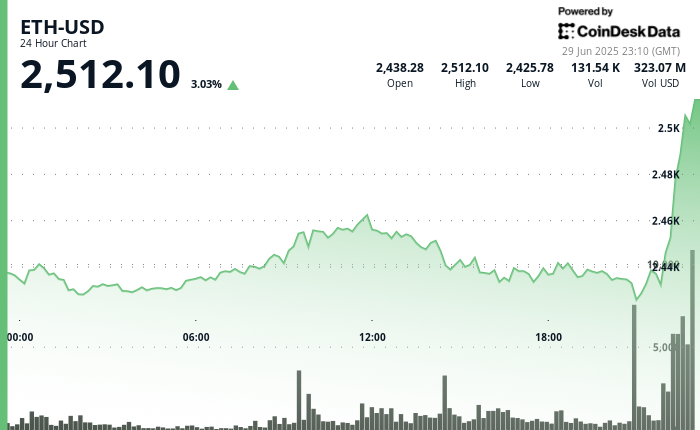
-
An
early-stage
app
called
Moonwalk
lets
users
boost
the
stakes
for
their
fitness
goals. -
Customers
contribute
cryptocurrencies
to
join
a
challenge,
and
if
they
fail
to
meet
their
daily
step
goal,
they
surrender
money
to
a
prize
pool
shared
by
the
other
participants.
SALT
LAKE
CITY
—
It
was
sometime
around
dinner
as
I
was
drinking
a
jungle
juice
that
the
bad
news
dawned
on
me.
I
texted
my
boss:
“If
I
don’t
walk
another
4,400
steps
I’ll
lose
$333.”
Such
are
the
economics
lessons
you
get
when
you
turn
your
daily
steps
into
fodder
for
the
group
building
a
crypto-based
fitness
game
called
Moonwalk.
The
premise
is
this:
People
are
more
likely
to
hit
their
fitness
goals
(say,
a
daily
step
count)
when
there’s
some
external
force
holding
them
accountable.
Perhaps
it’s
their
friends
or
a
financial
reward.
In
Moonwalk,
it’s
both.
On
a
chilly
Utah
Wednesday,
someone
from
the
8-month-old
startup
convinced
me
and
three
other
attendees
of
mtnDAO
–
the
month-long
coworking
space
in
Salt
Lake
City
full
of
developers
building
apps
for
the
Solana
blockchain
–
to
essentially
bet
on
ourselves
in
the
step-counting
game.
We
were
to
be
among
the
first-ever
outside
testers
of
their
platform,
in
which
players
pool
their
assets,
commit
to
hitting
a
daily
step
goal
and
then
hope
–
I
guess
–
that
the
other
players
miss
theirs.
The
buy-in
for
our
three-day
challenge
was
$1,000
of
the
USDC
stablecoin.
Each
of
us
had
to
walk
10,000
steps
a
day;
every
day
we
miss
that
goal,
we’ll
surrender
$333
to
the
prize
pool.
At
the
end
of
the
challenge,
those
who
meet
the
daily
goal
split
that
pool.
We
each
have
full
control
of
our
original
deposits;
as
long
as
we
walk
10,000
steps
a
day,
we’ll
get
that
money
back.
“It
will
trick
you
into
getting
fit
so
you
don’t
lose
money,”
Marbius,
a
pseudonymous
product
manager
working
on
Moonwalk
from
mtnDAO,
told
a
potential
player.
Another
player,
the
pseudonymous
Grove
St,
summed
it
up
this
way:
“I
like
to
make
money.
I’ve
been
making
money
so
far.”
We
send
our
deposits
to
Moonwalk’s
omnibus
deposit
address
and
link
our
on-chain
accounts
with
health
profiles
that
source
step-counting
data
from
iPhones
and
Androids.
Every
10
minutes,
the
app
pulls
step
data
from
Google
Fit,
updating
our
game’s
leaderboard.
I
got
a
taste
of
life
as
an
early-stage
tester
when,
after
sending
my
money
to
the
address,
I
did
not
appear
immediately
on
the
leaderboard.
Marbius
assured
me
this
was
a
“known
bug”
that
happens
when
players
reload
their
web
pages
while
their
deposits
are
in
transit.
Sure
enough,
I
showed
up
shortly.
I
felt
the
need
to
start
walking
immediately.
Now
I
had
money
on
the
line.
I
took
a
quick
stroll
in
the
winter
weather.
It
would
get
dark
in
a
few
hours.
I’d
better
get
my
steps
in
soon.
Moonwalk’s
ambitions
stretch
beyond
step-counting
and
into
many
different
areas
of
fitness,
founder
KW
told
me.
He
plans
to
“make
more
games
incentivizing
positive
behavior
change.”
For
now,
though,
it’s
limited
to
steps.
Over
the
course
of
three
days,
I
and
six
other
players
logged
tens
of
thousands
of
steps
in
our
rush
to
avoid
losing
our
stablecoins.
Only
one
player
screwed
up.
Twice
he
missed
his
10,000-step
goal,
losing
$666
to
be
divided
up
by
the
rest
of
us.
That
was
just
as
well
for
me.
When
everything
was
said
and
done,
I
walked
away
with
$111
in
prize
money.
“I
think
Moonwalk
just
makes
it
more
fun
and
engaging
to
do
something
simple,”
said
Anders,
the
intern
at
Mrgn
Research.
“It
makes
it
more
competitive,
too,
which
makes
it
more
enjoyable.”
He
estimated
he’d
won
around
$800
in
just
over
a
week.
“I
definitely
plan
on
continuing
to
have
a
game
open
for
a
while.”
Meanwhile,
I’m
behind
on
today’s
steps.
